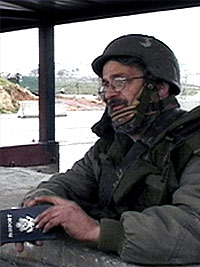
Palestine Post 9/11 2005
Distributed by Cinema Guild, 115 West 30th Street, Suite 800, New York, NY 10001; 212-685-6242
Produced by Osama Al-Zain
Directed by Osama Al-Zain
VHS, color, 73 min.
Sr. High - Adult
Middle Eastern Studies, Multicultural Studies, Political Science
Date Entered: 08/09/2005
Reviewed by Ethan Pullman, Reference and Instruction Librarian, Hillman Library, University Library System, University of PittsburghOsama Al-Zain follows Stanley Cohen, an American-Jewish Lawyer, on a journey to Palestine after 9/11 and explores the manner in which the western world, specifically the United States, and Israel have responded in terms of foreign policy towards Palestine. Documentation of this journey is injected with political analysis and commentary from Dr. Anthony Sullivan, University of Michigan, Phillis Bennis, Institute of Policy Studies, Joe Stork, Human Rights Watch, Dr. Ali Al-Hamida, University of New England, Dr. Edmund Gharib, American University, Dr. Fouad Moughrabi, University of Tennessee, and Dr. Imad, Al-Ahmed, Minaret of Freedom Institute.
The film’s main assertion is that 9/11 hurt the Palestinian cause. For one, the September tragedy was used by members of Al-Qaeda, whose only interest is to dismantle the monarchy of Saudi Arabia and who cares little about furthering the Palestinian cause, to rally support based on emotional response and not political judgment. In addition, major media contributed to creating a false tie between the attack and what is going on in Israel. Dr. Andrew Sullivan points out that “[Media in the U.S.] will never use the words ‘occupied territories’”. Mainstream media has managed to create a logical flaw in explaining the tie between the September attack on Americans and the Palestinian struggle against occupation. This in turn helped create U.S. foreign policy that impedes the resolution of Palestinian-Israeli issues. Another important statement that all commentators seem to agree on is that Palestinians must exercise good political judgment, and not emotional reactions, if they should draw support from the west. “They simply can’t blow up busses,” Dr. Sullivan asserts.
The audio and video qualities are certainly high. However, the film could use more sensitivity and careful editing, especially regarding some commentaries comparing the Palestinian-Israeli issue with South Africa. There’s simply no parallel and such comparisons are inflammatory, confuse the issue at hand, and only hurt the film’s intent. It is important to remember that it is an examination of the impact and aftermath of 9/11 on Palestinian issues, not the Israeli-Palestinian conflict. This point can be lost in this film because it spends quite a bit of time setting a historical perspective to Palestinian issues, and drawing parallels that frankly have no relevance to the issue at hand.
That said, I strongly believe that the film offers very strong comments regarding the issue expressed by its title and recommend it for college libraries as a tool to insight discussion and further research.